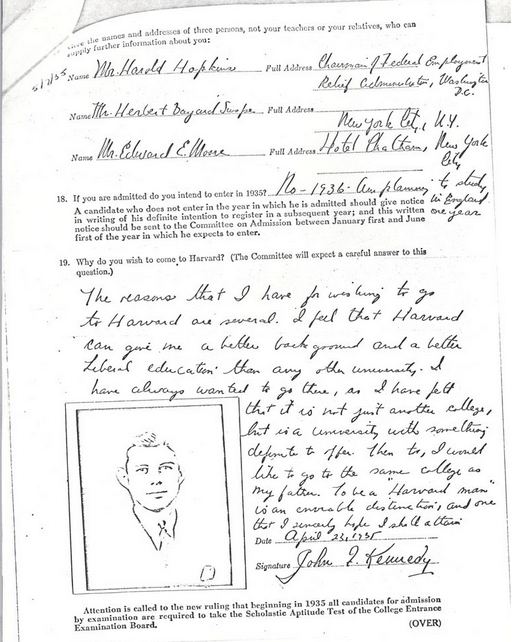JFK's Harvard Essay
/When future President John F. Kennedy applied to Harvard College in 1935, he faced the following essay question, which he answered in the following way:
Why do you wish to come to Harvard?
The reasons that I have for wishing to go to Harvard are several. I feel that Harvard can give me a better background and a better liberal education than any other university. I have always wanted to go there, as I have felt that it is not just another college, but is a university with something definite to offer. Then too, I would like to go to the same college as my father. To be a "Harvard man" is an enviable distinction, and one that I sincerely hope I shall attain.
April 23, 1935
John F. Kennedy
What did JFK do in his essay?
- He establishes his interest in getting a liberal education, and established Harvard as the school strongest position to deliver this service.
- He flatters Harvard and differentiates it by saying that it's not "just another college".
- He states his long held desire to go to Harvard.
- He mentions his legacy status.
How do we at Ivy Admissions Group evaluate his essay.
- The writing is crafted, but the story is bad.
- He does establish the uniqueness of Harvard, which is key to arguing that he should be admitted here, but he never explains why that point of differentiation is important to his future journey.
- His family connection and desire to attend (which are the heart of his essay) are esoteric; third parties like the Adcom don't really care about personal desires. Afterall, if the Adcom ran a hardware store with a limited inventory, why would would they deny someone aching to drive a nail by giving their last hammer to another who just really likes hammers? (but my dad had the same hammer brand!)
- JFK never talks about what he wants to do with his Harvard education or what journey he is on. When you offer a "quest" in your application, the Adcom's offer of admission is a vote for that cause, not just for you as a person. If you want to argue why they should just choose you as a person, you better be one compelling person!
- He never explains how he will give back to the school (unless it is implied by his wealthy father).
What lessons can we draw from this essay?
- When you have a rich famous father, make sure you mention him in your essay.
- Harvard's admissions have gotten a LOT more rigorous over the past century.











